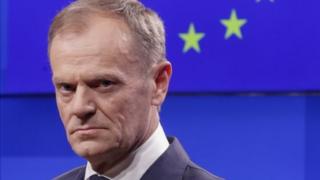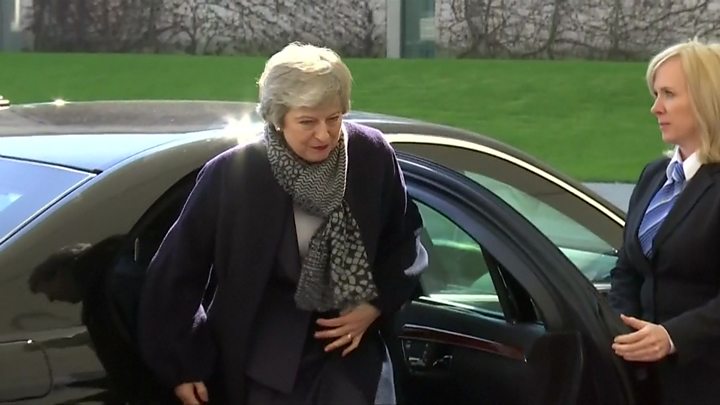Brexit: Donald Tusk suggests ‘flexible’ delay of up to a year
 Image copyright EPA
Image copyright EPA European Council president Donald Tusk says the EU should consider offering the UK a “flexible” delay to Brexit of up to a year, with the option of leaving earlier if a deal is ratified.
He said there was “little reason to believe” a Brexit deal would be approved by the extension deadline UK PM Theresa May has requested – 30 June.
Writing to EU leaders, he said any delay should have conditions attached.
It is up to EU members to vote on the proposals at a summit on Wednesday.
A draft EU document circulated to diplomats ahead of the emergency summit also proposes an extension but leaves the date of the proposed new deadline blank.
The BBC’s Brussels correspondent Adam Fleming said the document referred to an extension lasting “only as long as is necessary and, in any event, no longer than XX.XX.XXXX and ending earlier if the withdrawal agreement is ratified”.
The UK is currently due to leave the EU at 23:00 BST on Friday.
So far, UK MPs have rejected the withdrawal agreement Mrs May reached with other European leaders last year, so she is now asking for the leaving date to be extended.
Meanwhile, Mrs May has been meeting French President Emmanuel Macron in Paris and German Chancellor Angela Merkel in Berlin for talks ahead of the summit.
Afterwards, Ms Merkel said a delay that ran until the end of this year or the start of 2020 was a possibility.
Mr Tusk said granting the 30 June extension that Mrs May is seeking “would increase the risk of a rolling series of short extensions and emergency summits, creating new cliff-edge dates”.
And if the European Council did not agree on an extension at all, “there would be a risk of an accidental no-deal Brexit”, he said.
“One possibility would be a flexible extension, which would last only as long as necessary and no longer than one year, as beyond that date we will need to decide unanimously on some key European projects.”

Media playback is unsupported on your device
Mr Tusk said the EU would need to agree on a number of conditions to be attached to any proposed extension, including that there would be no re-opening of negotiations on the withdrawal agreement.
He said the UK should be treated “with the highest respect” and “neither side should be allowed to feel humiliated”.
BBC Europe editor Katya Adler said the EU’s draft conclusions “should be taken with a big pinch of salt” as EU leaders could “rip up the conclusions and start again” on Wednesday.
She said the fact that the length of delay had been left blank in the conclusions shows EU leaders were still divided on the issue.
Downing Street said Mrs May had discussed the UK’s request for an extension of Article 50 – the process by which the UK leaves the EU – until 30 June, with the option to make it shorter if a deal is ratified earlier, with both Ms Merkel and Mr Macron.
The prime minister and Chancellor Merkel agreed on the importance of ensuring Britain’s orderly withdrawal, a statement said.
Mrs May and Mr Macron also discussed next month’s European Parliamentary elections, with the prime minister saying the government was “working very hard” to avoid the need for the UK to take part as it is supposed to if it is still a member of the EU on 23 May.
Following a meeting of the EU’s General Affairs Council in Luxembourg, diplomats said “slightly more than a handful” of member states spoke in favour of delaying Article 50 until 30 June but the majority were in favour of a longer extension.
EU leaders are curious to hear the prime minister’s Plan B. They hope there is one, although they’re not convinced.
They want to know, if they say, “Yes,” to another Brexit extension, what it will be used for.
And they suspect Theresa May wants them to do her dirty work for her.
EU diplomatic sources I have spoken to suggest the prime minister may have officially asked the EU for a short new extension (until 30 June) as that was politically easier for her back home, whereas she believed and hoped (the theory goes) that EU leaders will insist instead on a flexible long extension that she actually needs.
The bottom line is: EU leaders are extremely unlikely to refuse to further extend the Brexit process.
Meanwhile, the latest round of talks between Labour and the Conservatives aimed at breaking the impasse in Parliament have finished for the day with both sides expressing hope there would be progress.
They are hoping to reach compromise changes to the Brexit deal agreed by Mrs May that could be accepted by the Commons, with Labour pushing for the inclusion of a customs union.
That would allow tariff-free trade in goods with the EU but limit the UK from striking its own deals. Leaving the arrangement was a Conservative manifesto commitment.
Environment Secretary Michael Gove said the talks had been “open and constructive” but the sides differed on a “number of areas”.
Labour’s shadow business secretary Rebecca Long Bailey said they were “hopeful progress will be made”.
Further talks will be held on Thursday.
On Tuesday afternoon, MPs also approved a government motion for Mrs May to ask the EU to delay Brexit until June 30, required after a bill from Labour’s Yvette Cooper became law.
If Labour and the government cannot agree on a way forward, Mrs May has promised to put a series of Brexit options to the Commons to vote on – with the government to be bound by the result.
These options could include holding another referendum on any Brexit deal agreed by Parliament.








